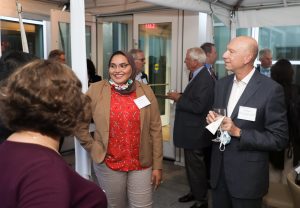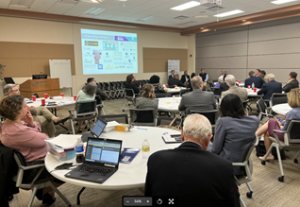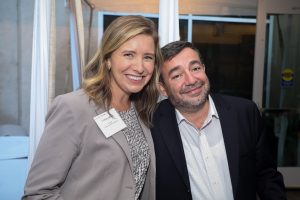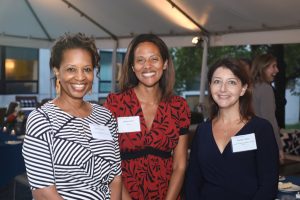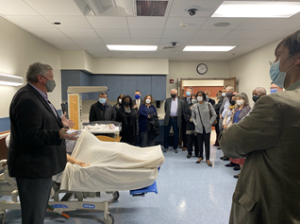Improving Health Outcomes for North Carolinians
Given ongoing debates about health care in North Carolina, as well as the COVID-19 pandemic and the issues it presented around health care needs and outcomes, the 2021 North Carolina Leadership Forum addressed the topic of healthcare, asking: How can we improve health outcomes for North Carolinians?
NCLF brought 32 participants from across the state to meet for four day-and-a-half meetings between October 2021 and April 2022. Participants included legislators, non-profit leaders, and business leaders. The first and last meetings were held at Duke University, and the second and third meetings were held, respectively, in Hickory and Greenville, NC.
Cohort 5: Health Policy Report
Across a variety of measures, North Carolina residents’ health outcomes compare poorly to the country overall. Of particular concern, health outcomes for some parts of the North Carolina population are worse, such as for African Americans and Native Americans, compared to the white population. Similarly, rural counties and lower-wealth counties also experience worse health outcomes compared to the state overall.
One contributor to health outcomes in the state is a lack of access to health care services, particularly in rural areas. Another challenge has been a workforce shortage of health care professionals, again particularly outside urban centers. A third barrier to improved health outcomes is cost.
The cohort explored foundational values related to healthcare and focused on the tension between affordability, accessibility, equity and quality of care. The group then considered three concerns they had identified: 1) the affordability of health care, 2) access to better treatment and insurance, and 3) the social determinants of health. They then explored the benefits and downsides of policy options that addressed these concerns. Examples of policy options discussed included a capitation model of payment instead of traditional billing, scope-of-practice reform for nurse practitioners and physicians’ assistants, expanding telehealth, reforming Certificate-of-Need Rules, expanding Medicaid in the state, encouraging consumption of healthy food, inclusionary housing policy, health care in schools, and early childhood care.
The report also includes a discussion of NCLF’s process and concludes with a section on what participants learned about leadership from the experience and NCLF’s lessons.
Participants from Cohort 5
Gale Adcock, State House of Representatives
Nida Allam, Durham County Commissioner
Donyel Barber, Gastonia City Council Member and Gaston County Family Health Services
Sydney Batch, State Senate
Ronny Bell, Professor, Wake Forest School of Medicine, and Director, Office of Cancer Health Equity at Wake Forest Baptist Cancer Center
Rick Brajer, former Secretary of HHS and co-chair, Governors’ Task Force on Mental Health and Substance Use
Phil Brown, Chief Community Impact Officer, Novant Health,and President, NC Medical Society
Jim Burgin, State Senate
William Buster, Senior VP of Impact, Dogwood Health Trust
Robert Clark, CEO of manufacturing firm and Winston-Salem City Councilman
Mandy Cohen, Secretary, NC Department Health and Human Services
David Craven, State Senate
Sarah Crawford, State Senate
Josh Dobson, NC Commissioner of Labor
Nicole Dozier, Director, NC Justice Center Health Advocacy Project
Brian Forrest, President, Access Healthcare, DPCMH, Professor at UNC CH and ECU
Dan Gurley, Deputy Chief of Staff, NC House Office of the Speaker
Michelle Hughes, Executive Director, NC Child
Ricky Hurtado, State House of Representatives
Lindsay Keisler, President, Catawba Chamber of Commerce
Sarah Riser Newton, SAS, leader of Gov’t Health Policy team
Nathan Ramsey, Land of Sky COG director, former member, NC House
Devdutta Sangvai, VP Population Health Management at Duke Univ. Health Services
John Simpkins, President, MDC
Karen Smith, M.D., Former President of NC Academy of Family Physicians
Tunde Sotunde, President and CEO,BCBS North Carolina
Sarah Stevens, State House of Representatives
Edwin Thomas, Financial Adviser, Northwestern Mutual
Michael Waldrum, CEO of Vidant Health System
Frank Williams, Brunswick County Commissioner, chair, NC Assoc of County Commissioners
Patrick Woodie, President, NC Rural Center
Magaly Urdiales, Co-Director, WNC Worker Center; NC Collab for Strong Latinx Communities

